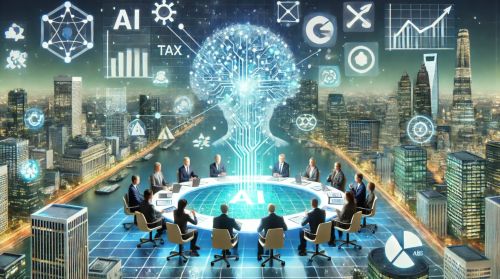

He is asking whether our legal and governance structures are agile enough to distribute the bounty of automation rather than let it concentrate power further.

By Matthew A. McIntosh
Public Historian
Brewminate
A World Remade by Artificial Intelligence
OpenAI CEO Sam Altman has recently shared a vision of a world transformed, one where artificial general intelligence brings not just efficiency, but a near-limitless economy. In a conversation on a popular podcast, he sketched a future where traditional economic models like capitalism and interest rates are reshaped by technology-driven abundance. This is a vision that confronts our longstanding economic assumptions while exploring fresh mechanisms for distributing wealth at a global scale.
Altman suggested that prosperity generated by artificial intelligence could make possible systems previously considered aspirational—universal basic income, sovereign wealth distributions, even new experimental currencies. In his mind, as productivity soars, society must ensure that gains do not gather only at the top. Only then will emerging abundance foster social cohesion rather than division. His comments come as a challenge to conventional frameworks, calling for a reimagined economy for a post-scarcity era.
Rethinking Capitalism with Automated Abundance
Altman’s proposition is as provocative as it is detailed. He mused that interest rates might go negative—down to minus two percent—as abundance becomes the norm and borrowing becomes too cheap to matter. He imagines sovereign wealth funds built on AI profits to support broad-based welfare and public goods. Experimental currencies could arise to make redistribution smoother, more adaptive.
It is a compelling picture. Yet it is also rooted in skepticism about whether current economic structures can manage the shifts ahead. Academic modeling supports parts of his thesis. One recent analysis suggests that if AI systems become five or six times more productive than today’s automation, they could generate enough wealth to finance a universal basic income totaling 11 percent of GDP, even without creating new jobs. If public revenue shares climb, that threshold shrinks further.
Such models highlight the scale of transformation possible, while reminding us that political choices—tax policies, market competition, access to AI—will shape whether abundance becomes shared or concentrated.
New Norms, Age-Old Concerns
Technology alone does not guarantee a fairer world. Altman acknowledges that social and cultural bonds—family, community—will anchor society even as work becomes less central to survival. That tension between roots and reinvention matters deeply.
Countries like India, he noted, have a pivotal role in this transition. Young adults in cities such as Mumbai and Bengaluru may be the first generation to genuinely benefit from this democratization of power. He sees them as uniquely positioned to build wealth, start global ventures, and drive innovation. That adds a human dimension to his theory—an affirmation that future systems must center individuals and communities as much as they center machines.
Yet there remain persistent questions. Will universal basic income disincentivize work? Can sovereign funds be managed transparently? What becomes of human purpose when labor is diminished? A recent universal basic income (UBI) pilot funded in part by Altman offered insight: while some participants worked less, the program notably improved food security and reduced stress. That study suggests UBI may be better understood as anti-poverty policy rather than a direct answer to automation.
Navigating the Pause
Balancing hope and caution is no easy task. Some analysts see a growing gap between AI hype and societal readiness. Recent commentary has referred to “Altman’s pause”—a moment where breakthroughs in AI performance face mounting skepticism about their real-world impact. Political backlash, regulatory ambivalence, and public disillusionment could stall progress unless gains become both visible and inclusive.
Without broad trust, even the most revolutionary vision risks backlash. It is a paradox: the more transformative the promise, the more fragile its path to realization.
A Vision Anchored in Policy and People
Altman’s vision is not utopia. It is an invitation to recalibrate our institutions. He is asking whether capitalism can evolve to funnel abundance into public good, rather than consumptive excess. He is asking whether our legal and governance structures are agile enough to distribute the bounty of automation rather than let it concentrate power further. In that sense, his vision is provocatively contemporary. It is not simple optimism. It is a call to rethink the economy as both machine and human ecosystem, bound by equity as much as efficiency. Whether that vision becomes a policy breakthrough or remains a technologist’s daydream may depend on how we interpret the first signs of abundance—and whom we choose to put at its center.
Originally published by Brewminate, 08.20.2025, under the terms of a Creative Commons Attribution-NonCommercial-NoDerivatives 4.0 International license.


